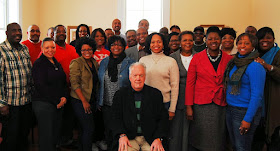(Redeemer, on a snowy morning.)
Whatever happened to "sin?"
I am told some churches rarely, if ever, talk about sin. Why not? Because
people will be turned off by it.
Other churches talk about sin. I do. Of course! The
entire biblical narrative, from Genesis to Revelation, will turn into one big
smiley emoji if we eliminate sin from the story. The story will be lost in its
entirety if sin is eliminated. Because then, there's no need for a Messiah, a
Savior.
If you use the word “sin” in public some
people will look at you like you are some kind of medieval religious crazy
person. Like: "Jimmy sinned a few days ago." Say that and
you'll get accused of being "judgmental."
I find all this ignorant, and troubling.
“Sin” is a word. Which REFERS to
something real.
·
“Sin” is a word
that refers to behaviors and actions that create alienation and isolation.
·
“Sin” is a word that
refers to choices and non-choices that cause emotions of anger and vengeance
and sadness and bitterness and bring tears and loss and grief and cries for
justice and so on and on and on…
·
If sin wasn’t about
something very real and very dangerous and very alienating, half the
movies that are made would not be made, and many of this world's tweets would
be meaningless.
·
“Sin” is a
big-time reality word. There are not a lot of things more
real than the reality of “sin."
·
The English word “sin”
is just an ancient word that refers to a reality that is still with
us. And within us, if anyone should care to self-examine.
·
Everyone does it.
Everyone has it. If you don't have it, then you can start throwing stones at
the rest of us.
·
"Sin" is one
biblical concept that is easily empirically verifiable.
G. K. Chesterton, in his book Orthodoxy,
wrote:
Modern masters of
science are much impressed with the need of beginning all inquiry with a fact.
The ancient masters of religion were quite equally impressed with that
necessity. They began with the fact of sin – a fact as practical as potatoes.
Whether or no man could be washed in miraculous waters, there was no doubt at
any rate that he wanted washing. But certain religious leaders in London, not
mere materialists, have begun in our day not to deny the highly disputable
water, but to deny the indisputable dirt. Certain new theologians dispute
original sin, which is the only part of Christian theology which can really be
proved. . . .
Sin is only meaningful if it has a reference
point. The reality of sin evokes the question, "in reference to
what?"
"Sin" falls short of something. Sin
doesn't measure up. If there's no reference point, then moral outrage is
absurd, and "sin" doesn't exist. Think about this.
Moral outrage is everywhere. Moral outrage is
currently (but who cares) politically correct. Moral outrage makes no sense if
sin (wrongdoing; evil; heinous acts; etc.) does not exist.
Everyone - me and you and you-know-who - has
screwed up, and landed short of the Reference Point. (On atheism, there is no
Reference Point. Philosopher James Spiegel states how difficult it is for the
noetic framework of atheism to discuss evil. "The very notion of “evil”
presupposes a standard for goodness which atheism cannot provide. Any notion of
evil or, for that matter, how things ought to be, whether morally or in terms
of natural events, must rely on some standard or ideal that transcends the physical
world. Only some form of supernaturalism, such as theism, can supply this. So
to the extent that atheists acknowledge the reality of evil, they depart from
their own commitment to naturalism." (The Making of an Atheist: How Immorality Leads
to Unbelief)
We need to talk more about
this, not less.
There always has been, and still is, a huge SIN PROBLEM in the world.
Churches should lead the way in this discussion.
And, BTW, "sin" and "death"
were the enemies Jesus came to defeat. How foolish for churches not to let
seekers in on this open secret.











